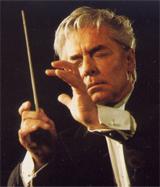Myspace Layouts - Myspace Editor
Biography by SonyClassical.com:Born in Salzburg on April 5, 1908, Herbert von Karajan began studying the piano at the age of four and performed for the first time in public at a charity concert the following year. Karajan studied at the Mozarteum Conservatory in Salzburg from 1916 until 1926 and was taught by Franz Ledwinka, Franz Sauer and Bernhard Paumgartner, the last of whom encouraged him to be trained as a conductor. He continued his studies at the Vienna School of Music until 1929. Karajan made his conducting debut in Salzburg on January 22, 1929. He first participated in the Salzburg Festival in 1933 and the following year conducted the Vienna Philharmonic for the first time. In 1938, he began his long association with the Berlin Philharmonic, culminating with his appointment as Music Director for Life in 1956. Karajan was the Artistic Director of both the Vienna State Opera from 1957 until 1964 and the Salzburg Festival from 1956 until 1960. As director of the Vienna State Opera, he also brought about an important collaboration between the company and Teatro alla Scala, Milan, where he had conducted regularly since his debut in 1948. In August 1964, Karajan was appointed to the board of directors of the Salzburg Festival. Another milestone in Karajan’s career was his founding of the popular Salzburg Easter Festival in 1967. Karajan’s long and distinguished recording career with the Berlin Philharmonic made him an international star. Over the years, these recordings consistently set new audio and musical standards against which other performances were judged. Among his many honours, Karajan received two Gramophone awards for recordings with the Berlin Philharmonic in 1981: Mahler’s Ninth Symphony, best orchestral recording; and the complete Parsifal, record of the year. Karajan and the Berlin Philharmonic toured the world frequently and to great acclaim. In 1955, the orchestra made its first appearance in New York and in a national tour of the United States, all under Karajan’s direction, returning the following year and in many subsequent seasons. Altogether between 1955 and 1982, Herbert von Karajan and the Berlin Philharmonic played 105 concerts in the United States. Other notable international tours included 11 visits to Japan -- the 1984 tour also took them to Korea -- and, in 1978, their first concerts in China. In addition, Karajan’s live concert broadcasts for German television from 1983 to 1986 enabled the Berlin Philharmonic to reach an audience well beyond the traditional concertgoing public. From his early years as a conductor, he enjoyed a distinguished association with the Vienna Philharmonic in hundreds of concerts and recordings that also form an important part of the Karajan legacy. In 1959, he toured the world with the Vienna Philharmonic, including 10 concerts in the United States. It was with this orchestra that Karajan undertook what would be his final international tour in 1989, including three memorable concerts in New York. Karajan also visited the United States with the Philharmonia Orchestra of London. In the fall of 1955, he toured the United States with the Philharmonia Orchestra, playing 24 concerts. Throughout his career, Karajan championed the use of visual media and new audio technology to enhance musical expression. Beginning in 1965, Karajan produced films of concerts and operas in association with French film director Henri-Georges Clouzot. Always interested in improving the listening experience for his audience, Karajan quickly adopted technological innovations. In January 1980, for example, Karajan made the first digital recording of Mozart’s The Magic Flute, and at the Salzburg Easter Festival on April 15, 1981, joined Polygram, Philips and Sony in introducing the “Compact Disc Digital Audio System†to the music world. Karajan founded Telemondial S.A.M. in 1982 to produce his complete repertoire again for video-disc, a new visual medium and an undertaking in which he had complete creative control of both vision and sound. In recognition of his achievements in the adoption of stereo sound in television and his commitment to the introduction of digital sound, Karajan was presented with the Eduard-Rhein-Ring by the founders of Hör zu magazine in 1984. Karajan was the recipient of many honours and awards, including the “Médaille de Vermeil†in Paris, the Gold Medal of the Royal Philharmonic Society in London (other conductors who have received this award include Arturo Toscanini, Sir Thomas Beecham and Bruno Walter), the Olympia Award of the Onassis Foundation in Athens and the UNESCO International Music Prize. Herbert von Karajan died in Salzburg on July 16, 1989.